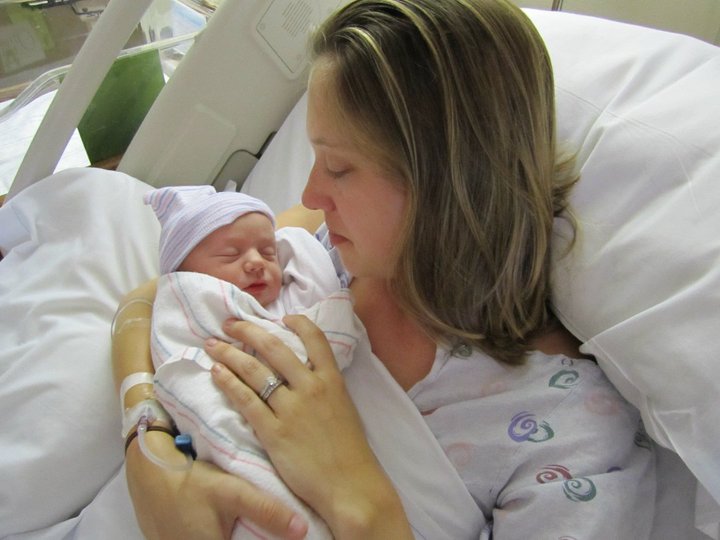Trigger Warning: In this post, I discuss my challenging experience with the birth of my first child. This might be hard for mothers who have had challenging and/or traumatic birth experiences. If you choose not to read, here are a few links that might be helpful to you during this time (they are also linked in the post).
Post-Traumatic Stress Disorder Symptoms
Solace for Mothers: An online support community for mothers healing from traumatic childbirth experiences.
My first child was born via cesarean. I had a bit of time to prepare for this, as he was breech and I knew that if he didn’t turn head down, I’d be having a cesarean. (I couldn’t find a provider who would attend a breech birth). However, this was not what I wanted. And I was still relatively unprepared for what the experience would be like during and immediately after the birth. Upon his birth, he was taken to the nursery for 3.5 hours before I had the chance to hold him. My husband went with him, and I was left in a recovery room alone. The nurse who occasionally checked in encouraged me to sleep while I could. I wonder if she even noticed how violently my body was shaking from the anesthesia and if she even considered that it might be hard to sleep when my brand new baby was away from me. I had a really challenging time getting breastfeeding established with him and I had a pretty rough postpartum experience.
At first, I tried to tell people the part of the story about how hard it was to be away from my baby and husband for so long after the birth. But I quickly learned that nobody wanted to or knew how to hear this. I was often railroaded into seeing the silver lining and told that it’s just great the he and I were healthy. I stopped telling this story for a few years. I’m sure now, 5.5 years later, that not telling my story in its entirety during my postpartum time and the first year or so of his life truly affected my emotional well being. I was sad, and felt guilty for being sad. And I couldn’t quite put my finger on what was wrong. At that point, I didn’t even consider writing my story down as a way to honor my experience and process it. I wish I had found a place, person, or group of people that would have listened. When I found ICAN (International Cesarean Awareness Network) a year and a half later during my second pregnancy, I finally realized the power of telling my story, acknowledging my experience, and processing it all. If I had done this during my postpartum time, I know that it would have changed so many things – how I recovered, how I bonded with my newborn, and how I felt about myself as a mother for the many months to come.
Your birth story matters for so many reasons. Our culture often sends us messages that we need to be grateful to have healthy babies and not dwell on how they were born. Please, don’t listen to this message. I know you are grateful to be healthy and to have a healthy baby. You don’t need to be reminded to be grateful. And that’s not all that matters. You don’t need your feelings about your birth experience to be invalidated and swept under the carpet.
Ina May Gaskin, well-known midwife and birth rights activist, discusses in her book, Birth Matters, the many reasons why birth matters. She says, “Birth also matters because the journey through pregnancy and birth offers an irreplaceable way for women to explore their deepest selves – their minds, bodies, and nature. Such a journey of self-discovery can help them prepare for the hard and underappreciated job of motherhood in a world now full of historically unique and complex challenges.” I wrote a little bit more about birth as practice for parenting here. If we don’t or can’t acknowledge our own personal journeys through pregnancy and birth, how can we fully engage in that process of self-discovery? And what are the consequences to our own psyche, well-being, and perceptions of ourselves as mothers?
Today, I encourage you to share your birth story. It doesn’t matter if you’re 3 days or 3 years postpartum. Start by simply writing it. Don’t stop and judge what you’ve written every 5 minutes. Just write. Once you’ve written it, reread it and let yourself experience the full weight of any emotion that comes along with it. I think you’ll begin to find it to be easier to share it with supportive people in your life. And all of this sharing will allow you to fully process it and reflect upon it. If your birth experience was traumatic, I urge you to seek support as you write it. Finding a mental health care professional to process your experience with you is very important if you have any symptoms of Post-Traumatic Stress Disorder. Solace for Mothers is an online community dedicated to mothers who have experience trauma in childbirth.
Our Peaceful Postpartum Online Retreat in January has one topic in which we’ll be focusing on telling our birth stories. We’ll be providing additional ideas and support to help walk you through this process and you’ll be doing it with a community of other new mamas. Please consider joining us!

